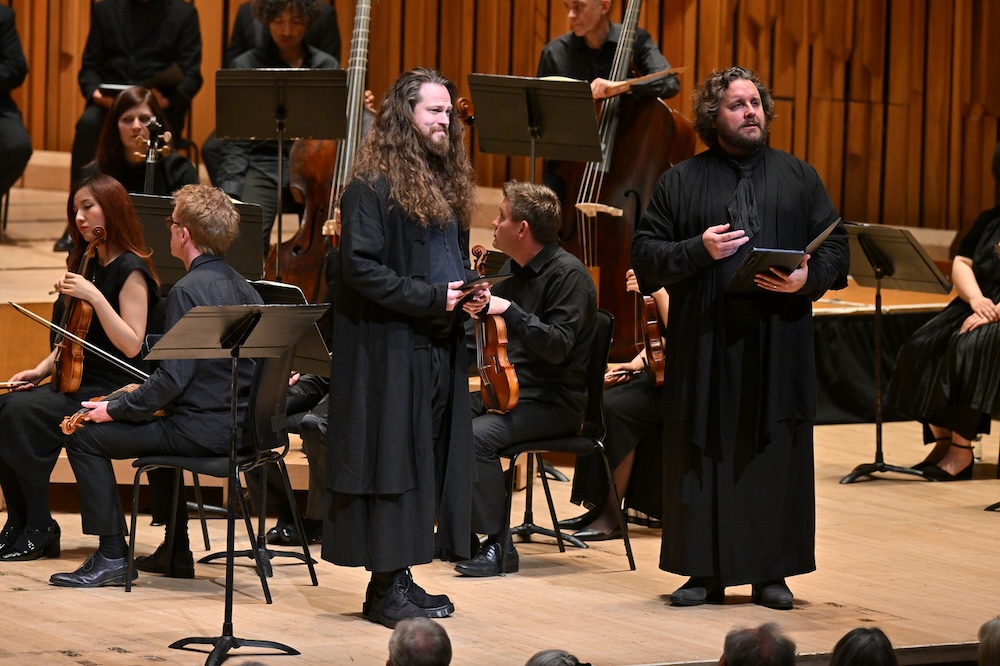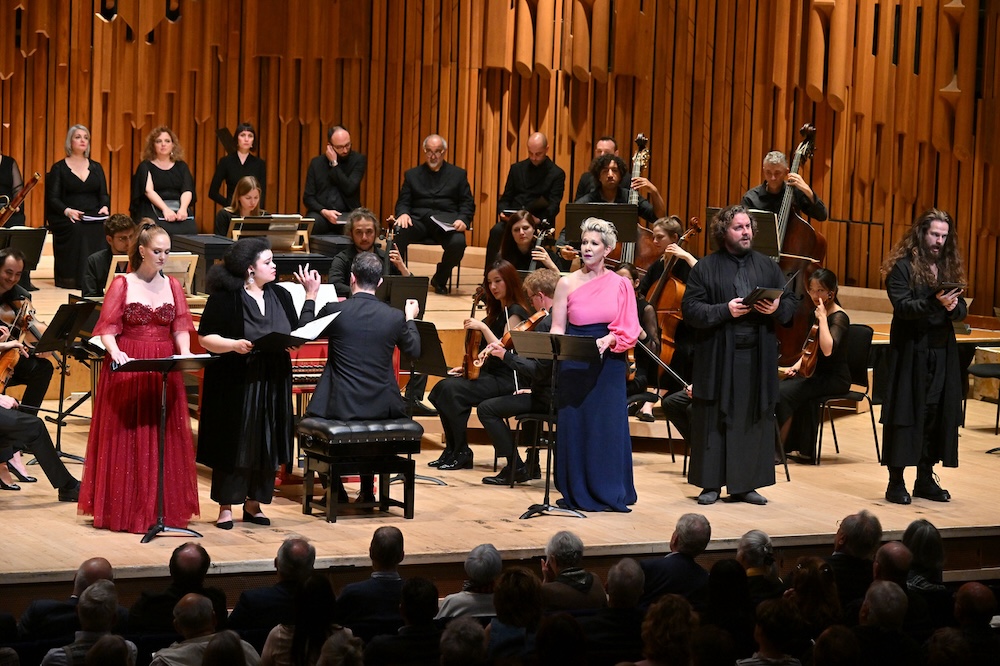Handel’s last oratorio presents, as amongst the composer’s catalogue of undeniable masterpieces, a masterwork of stunning stature. Not a note is misplaced in Jephtha: long though it is (more of that later), everything is perfectly proportioned, drama and music hand-in-hand. Thomas Morell’s text has a huge part to play in the success of Handel’s masterpiece, of course.
Talking of drama, there is a tendency to stage Handel oratorios of late, and Allan Clayton was an unforgettable Jephtha at Covent Garden, where his ‘Waft her, angels, through the skies’ an absolute miracle. And this story – a typically violent Old Testament one of twisted manipulation by ‘God’ with a final change of mind – seems particularly ripe for the stage. But the theatre of the imagination is a powerful place, and when the colours were painted as vibrantly as l Pomo d’Oro’s performance, there feels no doubt this is the way to go.
An odd fact is that Storgé has relatively few big arias. Why odd? Because Joyce DiDonato was given top billing – co-billing, admittedly, but above ‘baritenor’ Michael Spyres’ astonishing Jephtha – who is the titular character, after all. Handel’s placement of Storgé’s arias is, of course, perfect within the overall schema.
There were some attempts at dramaturgy, perhaps in the dress coding and a perhaps unintentional emphasis on the hirsute (for the male singers, obviously). But the drama came from the singers and the orchestra: Il Pomo d’Oro’s players in remarkable form under Francesco Corti. The Overture was gripping, the Menuet limpid and graceful.

Incidentally, the two brass players each played horn and trumpet. Not simultaneously, obviously, but one wonders if they used the same mouthpiece (in modern instruments they are markedly different) and whether the embouchure remained the same (placement of lips on the mouthpiece)? It worked, anyway, and Alexandre Zanetta and Olivier Mourault played with laudable abandon (and accuracy).
There were actually two vocal stars; just not, perhaps, the expected ones. The first was expected: Michael Spyres is utterly remarkable, his range really that of a ‘baritenor’: he is just as strong up top as he is going down into near-bass register. His first air, ‘Virtue my soul shall still embrace’ was given with utter confidence, both in terms of high register, and for the more agile passages (a nice sense of contrast in the violins with their legato here, too). If his ‘Waft her, angels’ was not quite that of Clayton in terms of cutting through to the heart, it was magnificently negotiated (the vocal contours are far from straightforward). At the other end of the emotive spectrum comes the remarkable recitative and air, ‘Horror! Confusion! …. Open thy marble jaws, O tomb,’ voice and strings in sepulchral unison, absolutely magnificent. And how stunning Spyres’ melding of line and text in ‘Hide though thy hated beams, O sun, in clouds’ as part of the lead-in to ‘Waft her’.
It was the Iphis of Mélissa Petit that was the revelation here, in the sense that Spyres was already something of a known quantity. Petit recently sang Gluck Euridice/Amore against Cecila Bartoni’s Orfeo Orfeo ed Euridice; small wonder she is in the big league. The air, ‘The smiling. dawn of happy days,’ was deliciously sprightly (voice and violins are often in unison here, at speed, and the delivery was stunning); she also has the perfect voice, light but not insubstantial, for the wonderful ‘Tune the soft melodious lute / Pleasant harp and warbling flute’ (some fabulous flute playing by Marta Gawlas here). How fitting, too, that Il Pomo d’Oro’s strings appeared as a halo around her accompgnaro, ‘For joys so vast too little is the price’ that immediately follows the news of Jephtha’s triumph and liberation of Israel, leading to the most remarkable ‘Happy they; this vital breath / With content I shall resign’. That news is, after all, the character’s death knell. Towards the close, Iphis sings, ‘Farewell, ye limpid streams and floods,’ moment after moment of enchantment, from pitch-perfect trills to the most natural of decorations.
More, Petit’s voice was the perfect complement to the darker colour of Jasmin White’s Hamor (another singer I would like to hear more of); the duet ‘These labours past, how happy we!’ was pure delight.
Jasmin White has great stage presence and a full voice that projects superbly well. Her recitative that opens Part Two (and which moves on the plot nicely) was gripping; her recitative and air, ‘If such thy cruel purpose … On me let blind mistaken zeal’ was simple, raw power.
The part of Zabul, Jephtha’s brother, was taken by Cody Quattlebum, his demeanor and look absolutely that of a fearsome Old Testament character, his ‘Pour forth no more’ strong and forthright, answered by the remarkable Pomo d’Oro Choir (arranged S-T-A-B). The recitative between Zebl and Jephtha in the second part (‘Why is thy bother so afflicted’) revealed two singers who both absolutely lived the words via Handel’s music.

The role of the Angel, too, was beautifully taken by soprano Anna Piroli. ‘Rise, Jephtha,’ begins her recitative (and he did); the air, “Happy, Iphis, thou shalt live’ was positively gleaming in tone. She is listed as a member of the chorus, and some readers might know her via her association with Jordi Saval’s Hesperion XXI. But my previous experience of her was also positive: as Donzella in Sacrati’s opera Le Finta pazza at Versailles in 2022.
But what of Joyce DiDonato? Her voice is as instantly recognizable as ever, but seemed less aligned with Handel’s world than her colleagues: in her air, ‘Scenes of horror, scenes of woe,’ the orchestra was significantly more on fire than the singer. Her eyes seemed glued to the score at times; ‘pangs’ (in the recitative preceding the air mentioned above) came across as ‘pengs’. DiDonato’s best moment came at the close of the piece, at the passage ‘O let me fold you in a mother’s arms’ (the text of this was in the programme, sadly not that of the air that follows, ‘Sweet as a Sight to the Blind’), but there is something of an irony in the ‘star billing’ feeling something of the odd woman out in an otherwise uniformly excellent cast.
The Pomo d’Oro choir is the perfect Handelian oratorio group: their entreaty ‘O God (behold our sore distress)’ was palpably felt in the stalls.
Aside from the music itself, Barbican polices could possibly do with a rethink. The programme states that latecomers will be admitted at a suitable break in the performance. ‘Suitable’ is obviously a movable feast: a lady let in had to sit on the step in front of me before for an extended period before she could get to her seat. And then there was the wine spillage that took so long to clean up and necessitated an audience member standing guard instead of Barbican staff to ensure no-one slipped. And talking of the programme, the text we were given did not necessarily match that used onstage, particularly in the final act where substantial portions were missing. And (another and!) Iphis is listed as ‘Ipihis’ on the cast list page. And (!) finally, why start at 7.30 pm? This is a long work, and it was way past 10.30pm when the evening came to a close.
Back to the music: It is worth noting this is not the only Jephtha story set to music: on April 18 his year, Chandos, in their Chaconne series, released a Jephtha by Maurice Greene (1696-1755) with a cast including Mary Bevan as “Jeptha’s Daughter “(her name is not specified as Iphis in that piece) and Andrew Staples as Jephtha himself. There is also Carissimi’s Jephte, much, much shorter (around 20-25 minutes), and recorded by I Fagiolini, who deliver a performance of remarkable beauty.
Tonight, though, it was Handel’s music that triumphed. What a piece of the purest genius.
Colin Clarke
Jephtha, HWV 70 (1751)
Composer: George Federic Handel
Libretto – Thomas Morell
Cast:
Jephtha – Michael Spyres; Storgé – Joyce DiDonto; Iphis – Mélissa Petit; Zebul – Cody Quattlebum; Hamor – Jasmin White; Angel – Anna Piroli
Conductor/Harpsichord – Francesco Corti; Il Pomo d’Oro
Barbican Hall, London, 7 May 2025
Photos: © Mark Allan